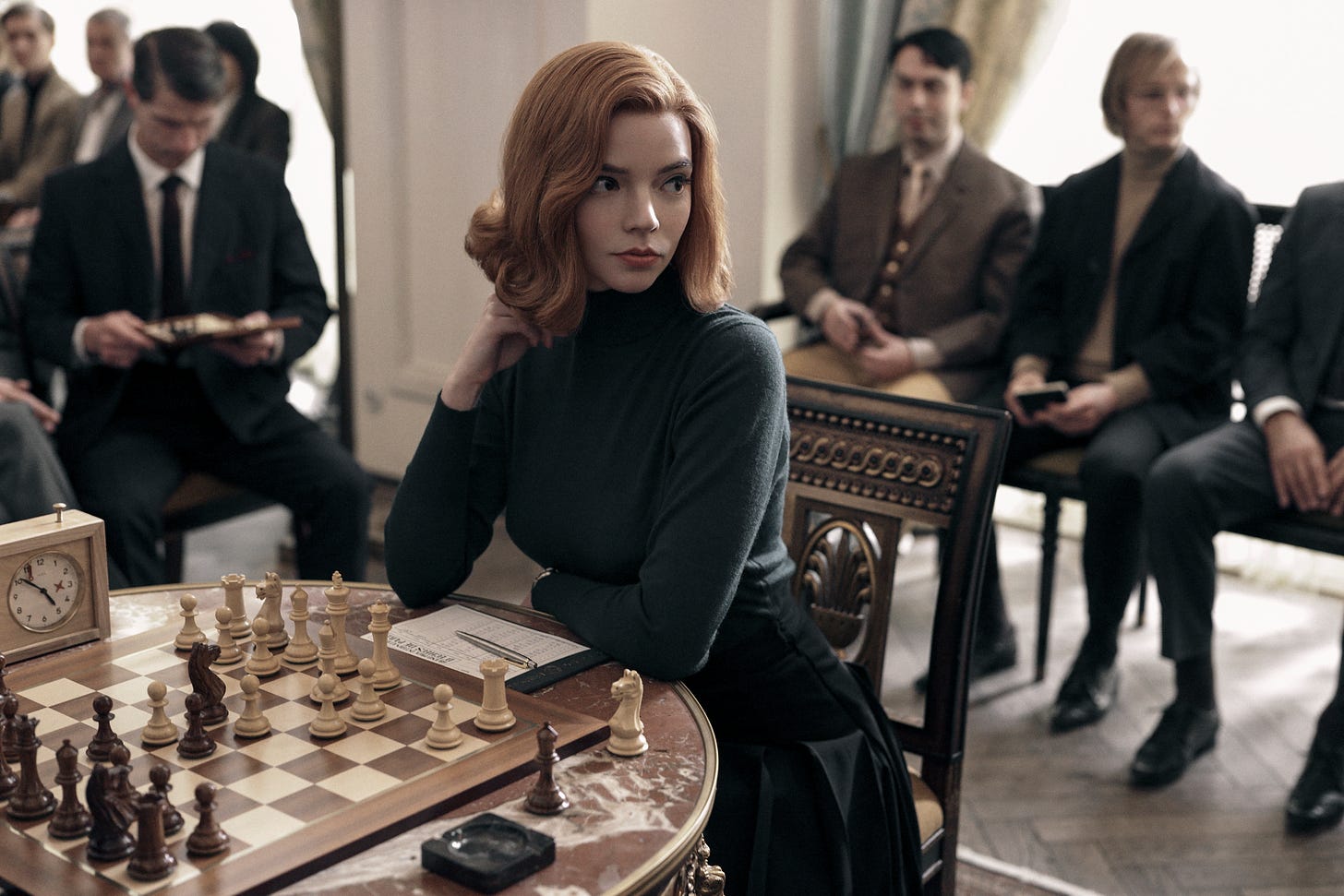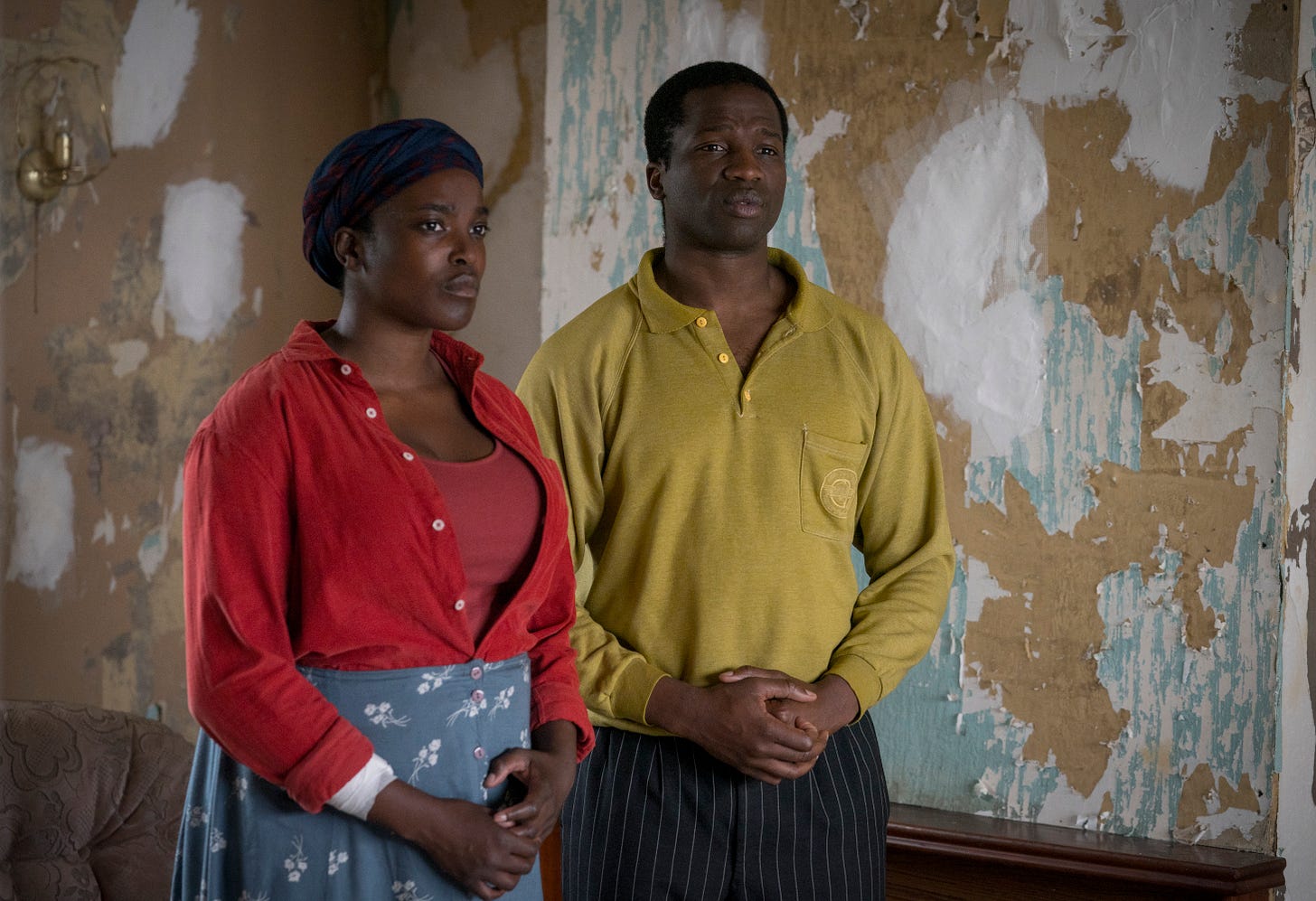The Queen's Gambit, His House, and stars to "defeat despair"
A chess hero's journey and a real-world horror film, plus cultures notes about celebrity assessments
Hello!
On this week’s episode of Criticism Is Dead, we discuss The Queen’s Gambit (2020), a show of high watchability, and His House (2020), a film as scary as it is devastating.
Click here to listen to the full episode on the web
Or listen on Apple Podcasts, Spotify, Stitcher, Pocket Casts, Google Podcasts, or other podcast apps.
00:30 The Queen's Gambit, a limited series from Netflix, is about trauma, but it is not traumatic.
This 7-episode series (please sir… give us more miniseries in general) reminded me a lot of fairytales or classic children’s literature, especially earlier on. Mike Hale, writing for the New York Times, calls its opening chapter “Dickensian,” which I think is accurate.
How much you like this show may depend on how successfully you think it pulled off its tropes (and there are many!), including but not limited to:
Orphaned at young age
Mysterious old man / wise mentor
Discovers “superpower”
Tragedy of losing mother figure
Figures from past reappear
Rule of threes: three times up against nemesis, three romantic interests
It’s not hard to predict where the story is going, given its adherence to story structure, but it’s still a thrilling-ish watch, even surprising in how it does not become “misery porn” despite being about addiction, trauma, obsession, and loneliness. Here’s an interesting thread on how the series (which is based on a novel by Walter Tevis) is almost like an alt retelling of the real-world story of Bobby Fischer, the American chess player who beat the Soviets (but ended up with a much darker fate):

The primary (small) quibble that I (Jenny) have with the show is the ways in which its characters orbit around the heroine Beth. What does that mean for Jolene, the sole major Black character in a very white world? There’s a scene in which Jolene comes to Beth’s rescue, to which Beth responds, gratefully, “You’re my guardian angel”—but no, she’s not, Jolene sharply corrects her. There’s this kind of meta-tension going on, a level of self-awareness that so many works of literature and art seem to have nowadays. Is acknowledging a trope enough to absolve the show of maybe still reenacting it? Pelin and I duke it out (not really, we come to rational compromise with mutual respect and love) on the pod.
Also, just for fun:
13:59 His House, also on Netflix, is the latest film in the current-day genre that roots its horror in real-world pain and atrocities, particularly those experienced by immigrants, Black people, and other survivors of the world's worst cruelties.
House House is, in the simplest terms, a “haunted house” film, but it’s so much more than that. For starters, the house is not the big Victorian mansion that we normally see in horror works like The Haunting of Bly Manor (or Scooby Doo); it’s a rundown council flat.
The film is also not so much about the ghosts of the house itself, but rather, what demons the new inhabitants bring to it. Having crossed dangerous lands and waters, having experienced unspeakable horrors and trauma to arrive at this house, the main characters Rial and Bol have plenty of those.
His House is the latest example of how the horror genre has evolved since the “torture porn” days of the Bush era. Filmmakers like Robert Eggers, Ari Aster, and especially Jordan Peele exemplify this shift. “To find the scariest monster we need look no further than the human demon,” Peele said before the release of Get Out. Real emotional themes used to sit in the passenger’s seat of horror; now they’re in the driver’s, leading the narrative.
There’s also an analogue between His House and Atlantics (also on Netflix), a love/ghost story about a group of men who try to traverse the ocean for a better life in Europe.
“The world does not know how to protect its most vulnerable people,” says Pelin. That is the real horror.
23:04 Plus, culture notes about an attempt by the Trump administration to "defeat despair and inspire hope" amid the pandemic by recruiting celebrities for a PSA, resulting in one of the inadvertently funniest assessments of modern celebrity.
From the Washington Post:
A top Trump administration official inserted “partisan political interests” into a $250 million advertising contract awarded just weeks before the election to “defeat despair and inspire hope” amid the coronavirus pandemic
[…]
Among those who did not make the cut were actress Jennifer Lopez, because she had criticized the president’s immigration policies at her Super Bowl performance; director Judd Apatow, because he “believes Trump does not have the intellectual capacity to run as President”; and singer-songwriter Billie Eilish, described as “not a Trump Supporter” and notes she described Trump as “destroying our country and everything we care about,” according to a document that outlines issues with numerous celebrities under consideration for the campaign.
Politico, which broke the news, came through with the full doc, titled “PSA Celebrity Tracker.” Scrolling through this spreadsheet is maybe the best way you can spend 10-15 minutes today, because I guarantee it is the funniest and most baldly shameless commentary on modern celebrity you’ll have seen in a while.
Enjoy!
Bonus links
The disrespect of this uncanny Keira Knightley impression!!!
A very industry insider-y look at “Netflix’s upheaval” among its top ranks.
Do we really need a Michael Bay film about a COVID dystopian future (spoiler alert: we’re living in one sweetie!)
Finally, stay safe out there.
— Jenny
Follow us on Twitter and Instagram.
If you’re listening to this episode on desktop (okay???), please head on over to Apple Podcasts, Spotify, Stitcher, Pocket Casts, or Google Podcasts and rate/review (only good ratings welcome!!!)
Inquiries, complaints, and recs for what to watch can go to criticismisdead@gmail.com.
Some credits:
Music: REEKAH
Artwork and design: Sara Macias and Andrew Liu
Special thanks: Dan Geneen







